What Judaism and the Islamic World Meant for Prince Vladimir
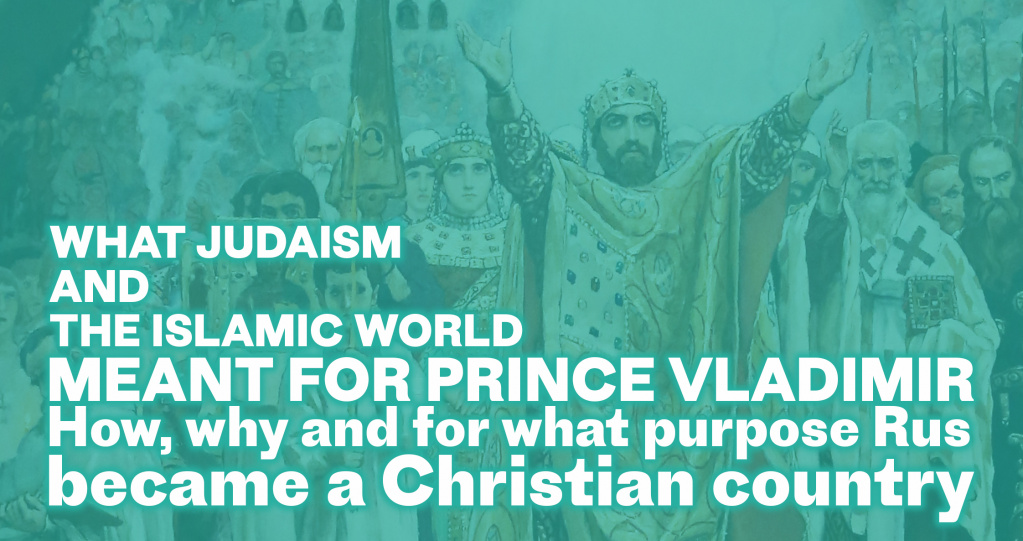 How, why and for what purpose Rus became a Christian country
How, why and for what purpose Rus became a Christian country
Pavel Kuzenkov, candidate of historical sciences and Byzantologist
More than a thousand years have passed since the epochal moment when Grand Prince Vladimir accepted baptism and called upon the boyars and the whole nation to follow his example. The Baptism of Rus was not the prince’s personal choice: it provided the moral compass by which the Russian state was formed and a single Russian nation was forged from numerous tribes. The land of Russia identified itself as part of the great Eastern Christian world, the spiritual centre of which was Orthodox Byzantium. And five centuries later, after the fall of the New Rome, the grand princes, the Russian tsars and emperors, who had revived Old Rus, thought of themselves as leaders of an Orthodox civilization which in many ways was opposed to the so-called Western world.
The blood-soaked twentieth century, a century that saw the collapse of centuries-old traditions and powerful empires, saw the end of the path of Christian statehood begun in the fourth century by the Equal-to-the-Apostles Constantine the Great. Minds and nations were engulfed by ideologies which would not accommodate God. But all of these doctrines, which made their cornerstone the human person, the nation or an oppressed class and so on, were short lived. And today Russia is now able to return to the roots which earlier sustained her as a great power. But the situation from a thousand years ago has repeated itself. Arguments on the ‘choice of the path’ have flared up once more with renewed strength. What sort of country should the new Russia be? Should we return to the choice once made by Prince Vladimir and which was adhered to by our ancestors for almost a thousand years? Perhaps this choice was a tragic error? And indeed, what were the events of 988, the year conventionally accepted as the year of the Baptism of Rus?
In order to answer these questions, let us turn to the sources and attempt as far as is possible to analyze dispassionately for what reason and for what purpose St. Vladimir accepted baptism.
What do we know? The sources
Let as look at the sources from which we glean our knowledge of the Baptism of Rus. Surprisingly, there are not so many of these sources. They are, however, very varied in their origins, which significantly enhances their value.
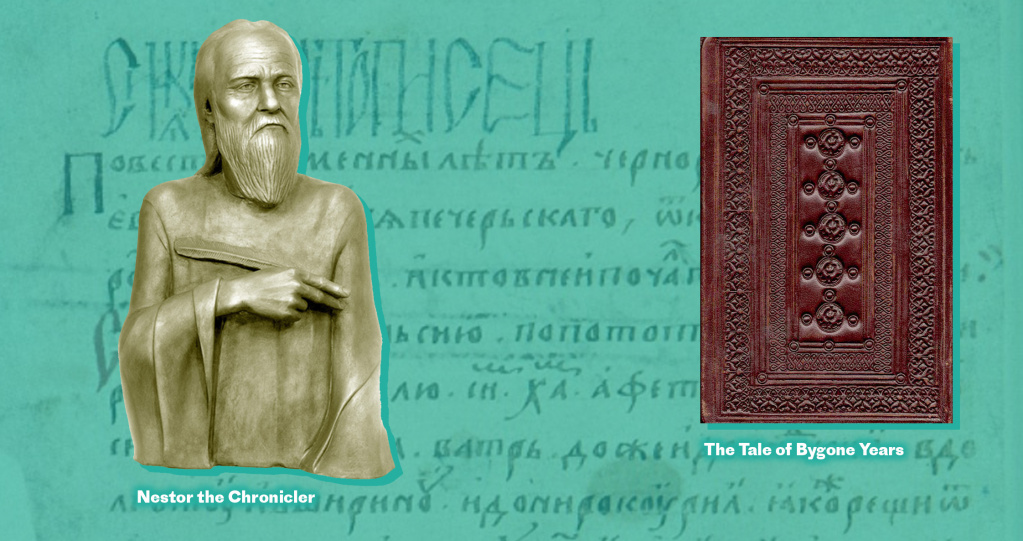
The Old Russian sources
The foundational version of Old Russian history which has come down to us is known as The Tale of Bygone Years and appeared some one hundred years after the Baptism of Rus. We may reasonably ask ourselves how is it possible to trust the story of the chronicle which describes this event. The author is, of course, evidently a spiritual person (the author has traditionally been believed to be the monk of the Monastery of the Caves in Kiev Nestor the Chronicler) and is far from indifferent towards the sacred meaning of the event, as is evidenced by the numerous rhetorical insertions into the texts of biblical quotations. But a number of the narrative’s details (including indications of the event’s topography) indicate that on the whole the story of the chronicle of the baptism has an ancient basis going back to eye-witnesses of the event.
What does the chronicle indeed tell us? We refer the reader to the complete translation of The Tale of Bygone Years published by the Russian Academy of Sciences, while lovers of the Old Russian language may turn to the edition published in the Complete Collection of Russian Manuscripts. We will retell it in short form.
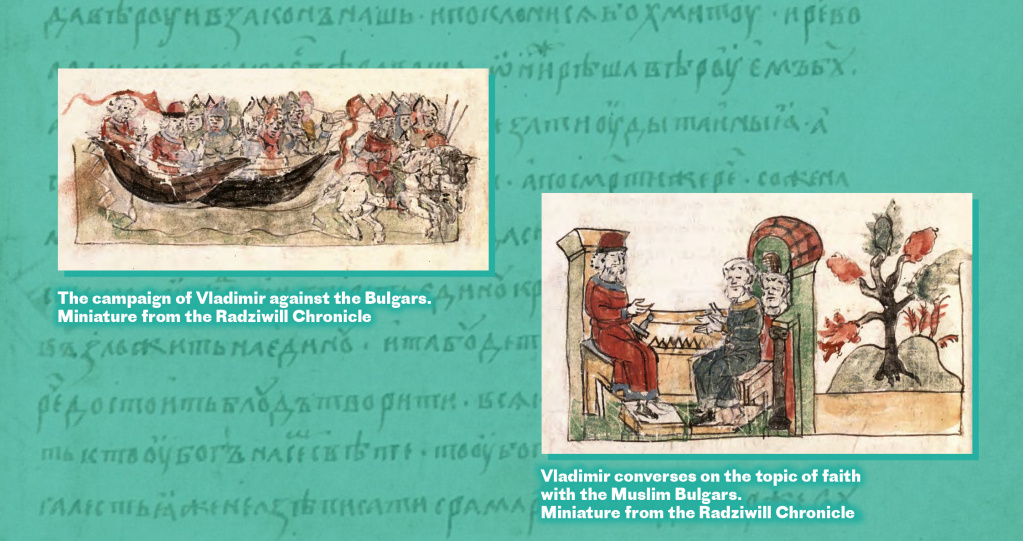
In the year 6493 from the creation of the world (AD 985 according to our modern-day calculation) the chronicler relates Prince Vladimir’s campaign against the Bulgars and the peace he concluded with them. It is clear that what is meant here by ‘Bulgars’ are the Volga Bulgars who had recently converted to Islam. Indeed, in the following year of 986 there came to Kiev an embassy of “Bulgars of the Mohammedan faith” with an unexpected proposal for Vladimir: “You, O prince, are wise and thoughtful, but you do not know the law; believe in our law and worship Mohammed.” The Russian prince, who had only recently erected in Kiev a pagan pantheon and conducted human sacrifices, reacted in an unexpected manner. Instead of the hardened pagan rejecting this proposal that he would have considered demeaning by betraying the “faith of his ancestors”, he instead made inquiries: “What is the nature of your faith?” he asked and quite favourably listened to the simple postulates of the Islamic religion. The woman-loving prince liked the prospect of heavenly pleasure with beautiful houris, but circumcision and the refusal to eat pork did not meet with the prince’s approval, while the prohibition on drink he commented upon with the famous phrase: “It is the joy of Russia to drink – we simply cannot exist without it!” (We note in parentheses that he was not referring to vodka or even to wine; mead drinks in Old Russia were more like kvas or fomented beer).
Properly speaking, it is with this episode that the chronicle narrative of the “choice of faith” begins, culminating with the baptism of both Vladimir and all Rus. The story is undoubtedly semi-legendary and made of several layers, but far from as fantastic as it seemed until recently.
The news that the mighty Russian prince had taken an interest in religious affairs quickly flew around the world, and soon after the Muslim Bulgars there appeared in Kiev “Germans (the Novgorod First Chronicle adds “from Rome”) sent by the Pope” with the words “Our faith is light, for we worship the God who created the heavens and earth, the stars and moon and all things that have breath. Your gods, though, are but wood.” The prince on this occasion too asked: “What is the nature of your commandments?” and, having received an answer, sent the envoys back with the words: “Our fathers never accepted this!” This reply is important testimony to the authenticity of the chronicle story. Indeed, we know from Western sources that in 961 the German preachers sent by Otto I (who in 962 was made pope as well as ‘Holy Roman emperor’) attempted to baptize Rus but were driven out by Vladimir’s father Prince Svyatoslav.
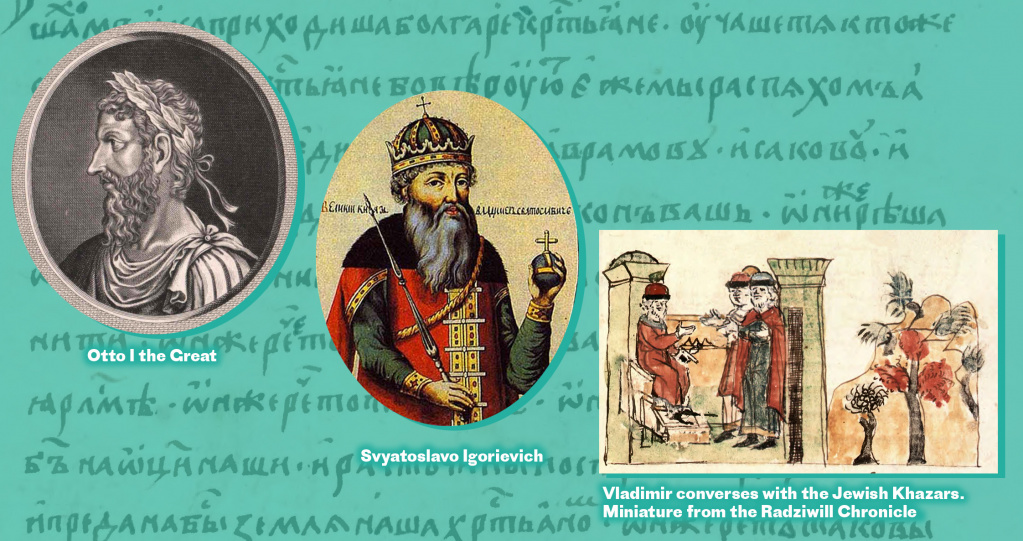
After the Bulgars and Germans there came the Khazar Jews. They declared that those who believed in the One whom Christians believe in was crucified on a cross and that they – the Jews – believe in the “one God of Abraham, Isaac and Jacob.” Vladimir then also posed the question: “What is the nature of your law?” and, having heard them out, posed a simple yet cunning question: “Where is your homeland?” It was hardly coincidence that the Russian prince had touched upon the most sensitive question for the Jewish religion. Indeed, when they were expelled from Jerusalem in AD 70 the Jews had not only lost the land of their forefathers and their statehood, but also the only temple they had on earth. And for nearly 2000 years the Jews have been denied the chance of serving God. A truly terrible punishment! It is not in the least surprising that Vladimir accused his interlocutors of wanting to call down God’s wrath upon Rus, something which they themselves admitted was the cause of their being dispersed all over the face of the earth.
Finally there appeared before the prince an envoy from the Greeks. He was the last to come. Yet he was no simple preacher but a philosopher. His speech, beginning with accusations addressed to his rivals and ending with a picture of torments in hell for those who do not believe the right way, occupies many pages in the chronicle. In essence it was a short course in sacred history from Adam to Christ and the apostles, whose teaching the Greeks had received. According to the chronicler, Vladimir was impressed by his talking and even more so by the image presented to him of the Last Judgment. He sent the philosopher away with many gifts but to the proposal that he accept baptism he replied: “I shall wait awhile.”
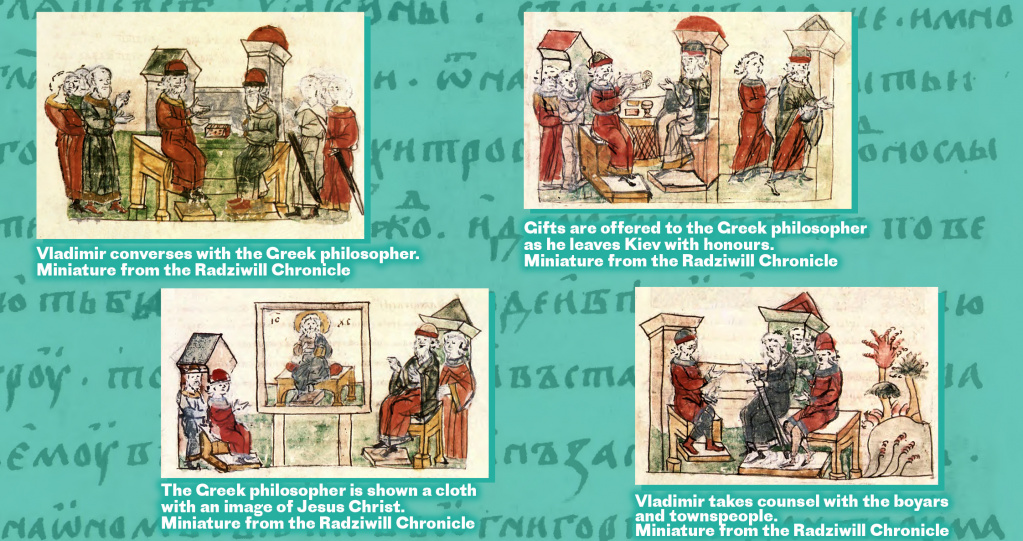
Further, the chronicle tells of the so-called examination of faiths. This story, for all its legendary form, has many historically true details. Upon gathering the boyars and the city elders, Vladimir told them of his conversations with the Bulgars, Germans, Jews and Greeks, and asked for their advice. The boyars and the elders, remarking wisely that “no one curses their own leader but praises him”, advised the prince to choose ten wise and trustworthy people and send them to these nations in order to “examine how each of them worships and how they serve God.”
Thus, the prince’s envoys set off to the Bulgars and visited a prayer service in their mosque. They were then sent “to the Germans” and from there to the “land of the Greeks.” The fruit of their mission is well-known: upon returning to Kiev, the embassy informed the newly-assembled elders and the prince of their impressions and spoke in favour of the Byzantine divine worship.
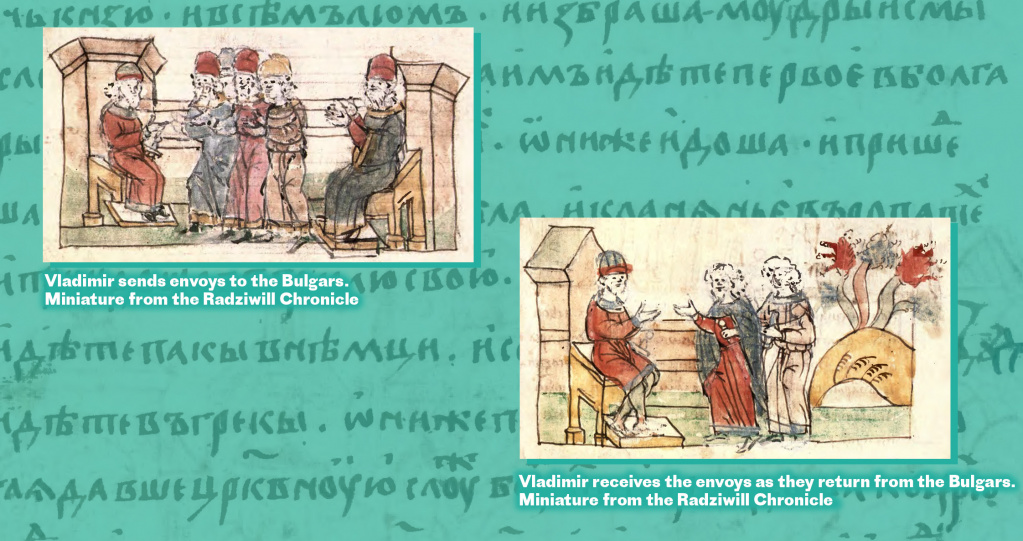
As though to affirm this assertion, the boyar pronounced his verdict: “If the Greek law was bad, then your grandmother Olga would never have accepted it, and yet she was the wisest of all people.” The prince’s decision was quick and somewhat unexpected. He said: “Then where shall we receive baptism?” To which they replied: “Wherever it pleases you!”
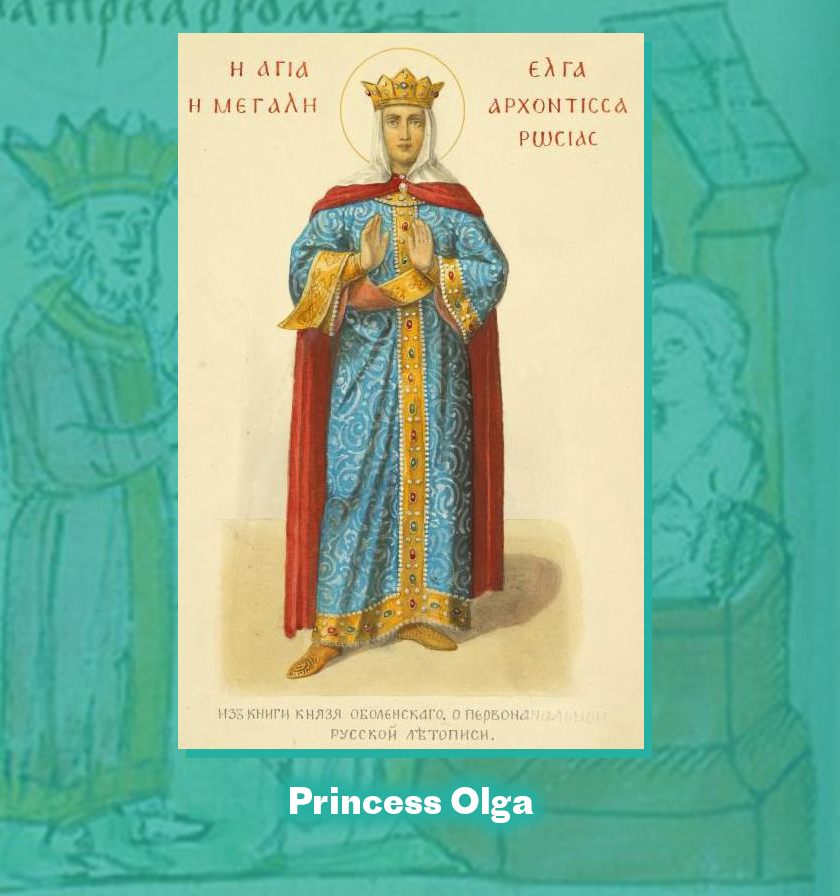
Why had the prince indeed posed the question in this manner? Was it not obvious that he should receive baptism in the capital of Kiev? It transpired that Vladimir’s plan was more sophisticated. Its meaning has been the subject of debate, but the following explanation would seem to be the most logical. Apart from the boyars and elders, the prince was also dependent upon the opinion of his retinue. It was in fact the mocking attitude of the retinue that was the reason for the resolute refusal by Svyatoslav to accept baptism, whose mother Olga had zealously tried to convert to Christianity.
In the eyes of the princely retinue, baptism at the hands of the Byzantine Greeks – the very same against whom military campaigns had been waged, whose wealth had been plundered and against whom the prince and the preceding Russian princes Svyatoslav, Igor and Oleg had gained fame – would look like an act of shameless pusillanimity. In order to retain his authority, Vladimir would have to solve the difficult task of receiving baptism from the Greeks, but without in the slightest way allowing this to be interpretated as an act of submission to them. And a solution was found.
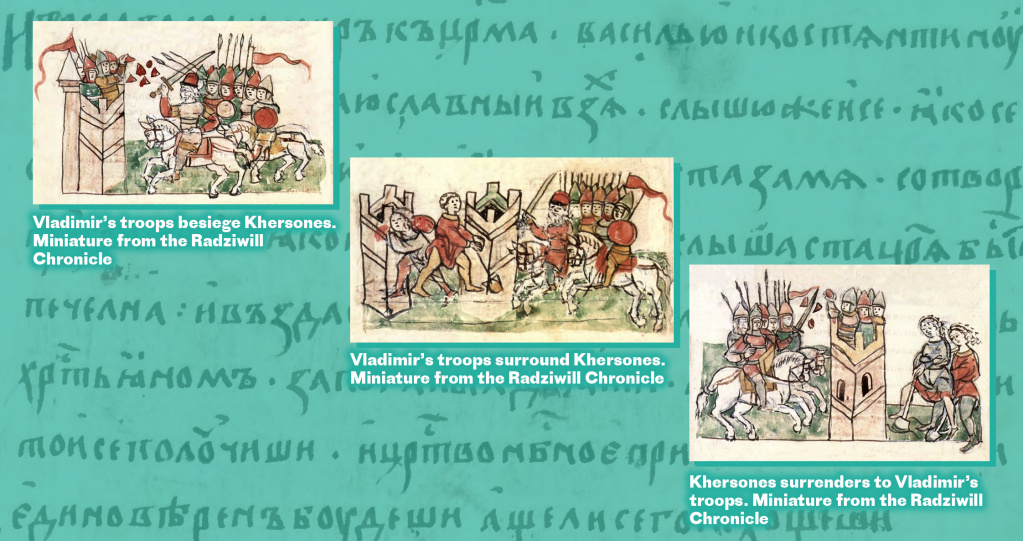
At the beginning of the next year 6496 (that is, from September 987 to August 988) the chronicle relates the campaign waged by Prince Vladimir against the main Byzantine stronghold on the north coast of the Black Sea Khersones, known in the middle ages as Cherson and in the Russian sources as Korsun. Having besieged the city, Vladimir sent an embassy to Constantinople to the emperors Basil II and Constantine VIII with an ultimatum: give me your virgin sister as a wife, or I will take also your capital. Anna Porphyrogenita, the sister of the basileis co-rulers, was most likely the most famous spinster in the world.
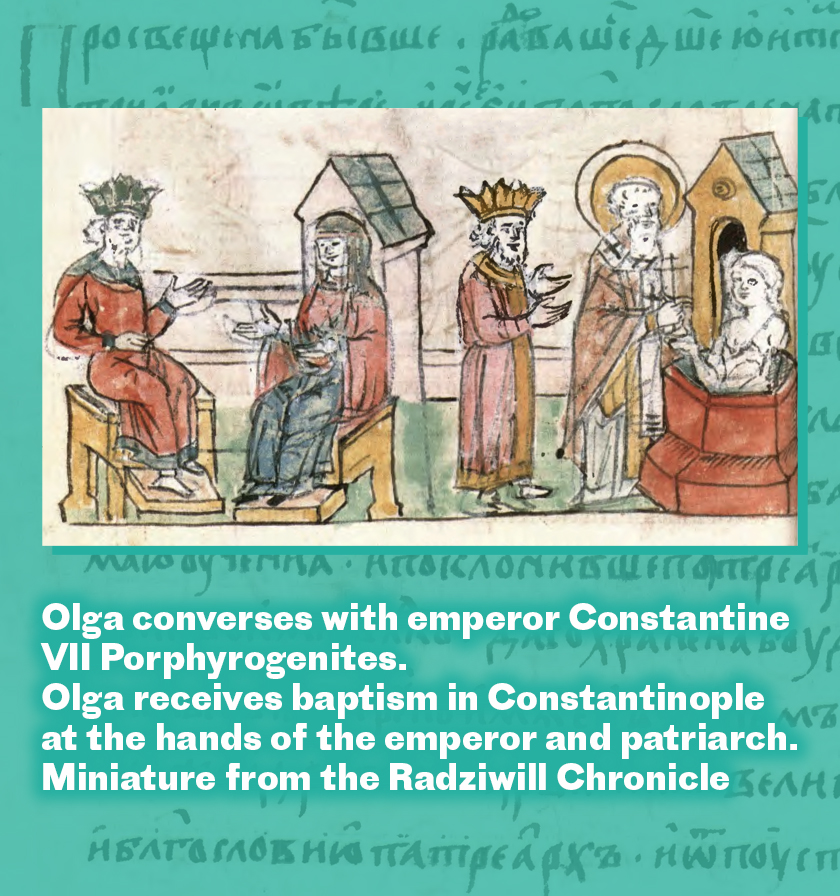
The Roman Germanic emperor and the tsar of the Bulgars attempted to woo her, yet no one was accorded the honour of being accepted into the imperial house of the New Rome. Indeed, giving a princess of imperial blood in marriage had been expressly forbidden by none other than Anna’s grandfather Constantine VII Porphyrogenites, in whose reign Vladimir’s grandmother the Russian princess Olga had accepted baptism in Constantinople. But now the situation demanded a resolution. Civil war raged in the empire and the downcast caesars had an interest in an alliance with Vladimir.
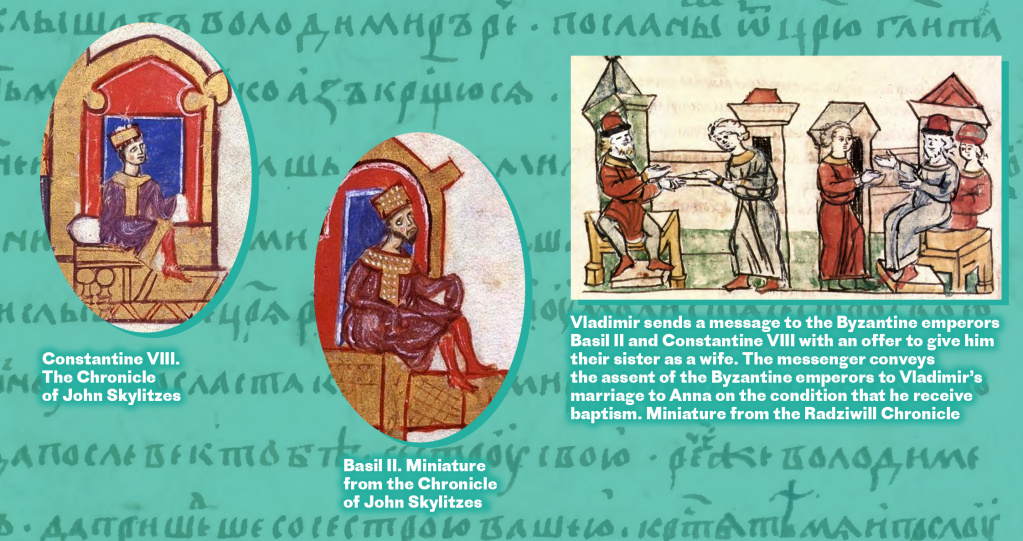
They replied in a wholly Byzantine manner, making out a tactical concession to be a victory: “It is not fitting for Christians to offer their kin’s hand in marriage to pagans. If you accept baptism, then you will get her, and you will also obtain the kingdom of heaven and you will also be the same faith as us.” Vladimir gave his consent, but emphasized that he was prepared to accept baptism but not because the emperors demanded it: “For I have earlier examined your law, and your faith and worship suit me, of which the men you sent had spoken.” After a fresh round of negotiations, it was decided that the Russian prince would be baptized by priests sent with Anna. It remained only to convince the latter, who was in a state of despair: “I am going as though into captivity; it would be better if I were to die here.” To this this her brothers objected: “It may happen that through you God will bring the land of Russia to repentance and deliver the land of the Greeks from this terrible war.” “And they barely convinced her,” adds the Russian chronicler in relating this story. It is difficult to ascertain the accuracy of this family scene, but Anna’s disposition and that of her brothers is relayed precisely.
The maiden who had grown up in the imperial palace could not but be horrified to think of a meeting with this northern barbarian polygamist (legends spread around Europe of Vladimir’s love of women – even the German chronicler Thietmar of Merseburg mentioned certain “Venus’s cuisses” which the Russian ruler supposedly wore in order to “strengthen his innate tendency towards fornication”).
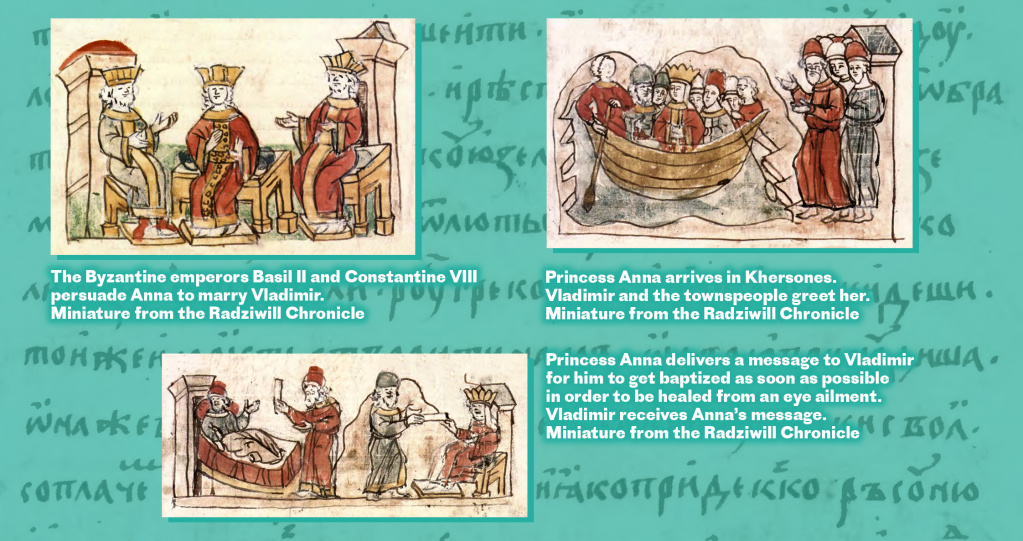
Anna embarked on a ship and, bidding farewell to her loved ones as she wept, set sail through the sea accompanied by her retinue and priests.
The ritual of the catechism and baptism of the Russian prince was performed, according to the chronicle, by the local prelate the archbishop of Khersones together with the clergy who had come from Constantinople. The chronicler relates how shortly before baptism Vladimir’s “eyes had become diseased” and that he could no longer see and that his bride the Byzantine princess, who had arrived yet had not seen him, advised him to receive baptism as quickly as possible so that he should be healed of this infirmity. And this is what happened, for Vladimir’s spiritual sight was returned at the same time as his physical sight. The former pagan proclaimed joyously: “For the first time I have seen the true God!” It is characteristic that it was after this miracle many of those among his retinue decided to follow the prince’s example. Many – but not all, and this is an important detail indicating that the decision to receive baptism was for the prince far from a natural and simple one as may be proposed.
According to the chronicle, after his baptism Vladimir built in Khersones a church dedicated to John the Baptist on the earthen hill made in the centre of the city during the siege. The hill had been constructed by the inhabitants using Russian soil. Then he handed over the city to the emperor and headed for home with Anna, Anastasius and the priests of Khersones and those brought by Anna, taking with him relics of Ss. Clement of Rome and his disciple Phoebe, church vessels and icons, as well as two bronze statues and four bronze horses (the chronicler makes clear that they now are located in the St. Sophia Cathedral and are mistaken by ignoramuses for being made of marble).
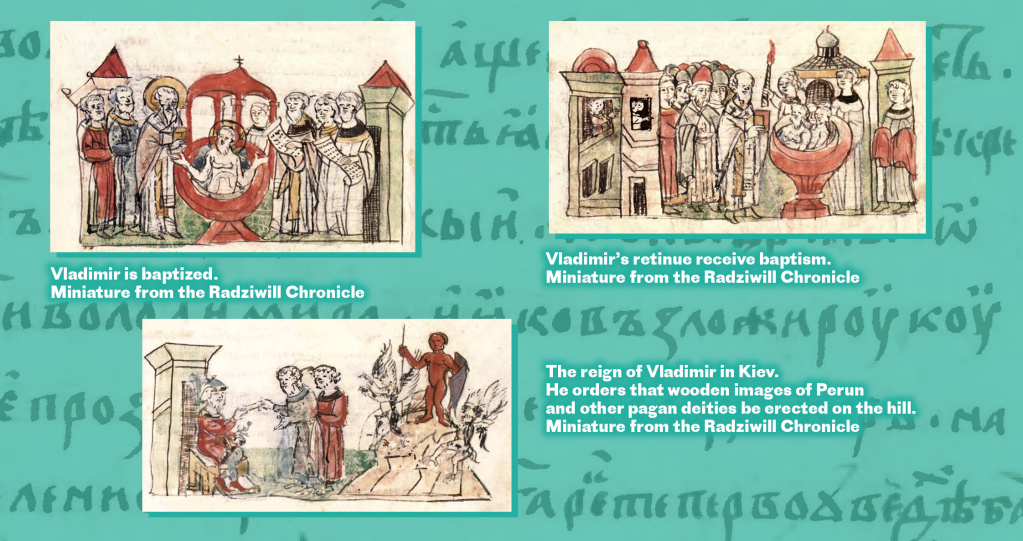
Arriving in Kiev, the victorious prince ordered that they the recently erected idols be cast down. Some were cut down, while others were burnt, and Perun was accorded the special honour of being tied to a horse’s tail and dragged “from Borivichi to Ruchai,” accompanied by twelve men who beat him with sticks (not because, the chronicler writes, that wood can feel blows but because the demon that had enticed people through it would get its just deserts).
The pagan Kievans did not mourn Perun for long. Vladimir sent his town criers throughout the city to proclaim: “He who does not present himself at the river tomorrow for baptism, whether he be poor or rich, will be my enemy.” The chronicler writes that those who heard this went with a sense of joy down to the River Dniepr, saying: “If this was not a good deed, then it would not have been accepted by the prince and boyars.” In the morning Vladimir went with the clergy to the Dniepr where there had gathered a great multitude of people, from old people to young infants in the arms of their parents. The priests recited a prayer and the people plunged into the waters and it was possible to see the great joy in the heavens and on the earth on the occasion of the salvation of so many souls. “And the devil,” writes the chronicler, groaned in anguish, saying: “I desired to live among these people who did not know the apostolic teaching and who did not know God and I rejoiced when they served me. But now I am vanquished not by apostles and martyrs, but by simple people. And I shall never again reign in these lands!”
Then the Russian prince gathered the children from the best people and took them away for “book learning” – in spite of the weeping of their mothers who did not want to leave their children and who mourned them as though they were dead. Thus, concludes the chronicler, there came true in Rus the biblical prophecy: “In those days the deaf shall hear words from books and eloquent will be the tongue of the tongue-tied.” It is beyond doubt that this “educational programme” enabled the religious reform of prince Vladimir, which was incredible to the many neighbours of Rus, and who could now be rightly called the ‘Equal-to-the-Apostles and Baptiser of Rus.’
The Greek authors
Strange though it may seem, the Byzantine authors writing in Greek practically “ignored” the Baptism of Rus under Prince Vladimir. This is all the more surprising as this event was directly linked to the imperial dynasty and one would think that it would be considered to be a major strategic success for the empire as it had acquired a powerful ally in the north.
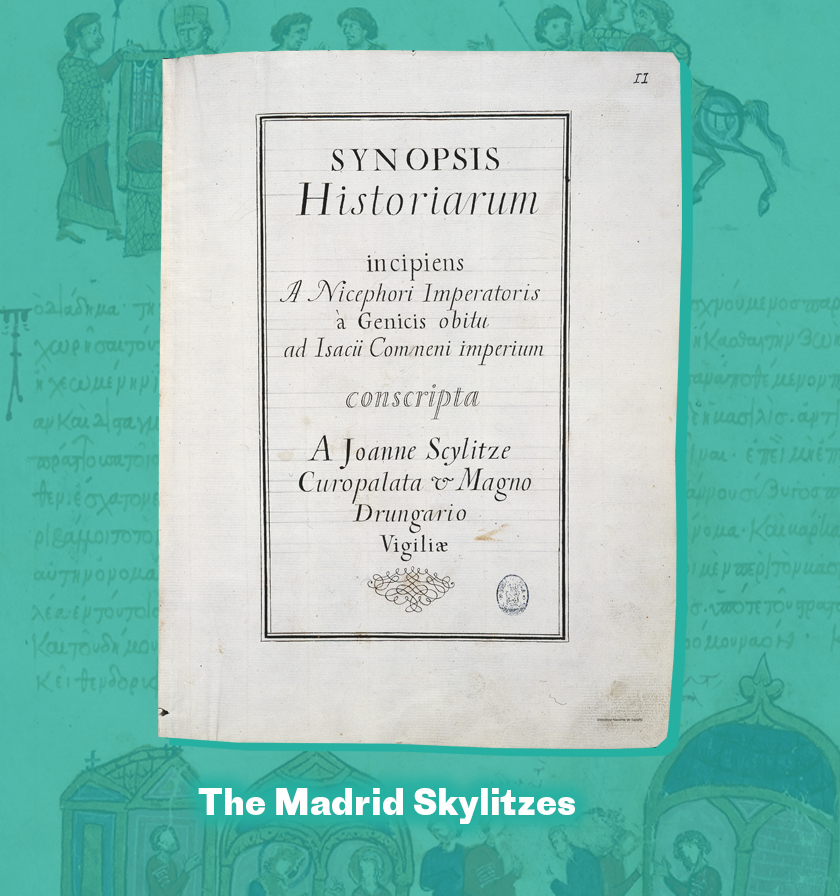
The reason for this silence could be the humiliating (for the Byzantines) circumstances of Vladimir’s baptism: the Russian prince received baptism when he had captured an important imperial city and in reality had compelled the emperors to hand over their sister Anna in marriage. What in the eyes of Russians showed Vladimir’s rightness as in accepting Christ he soon received from him obvious help, in the eyes of the Byzantines was a clear failure which would be better to pass over in silence.
Whatever the case, the Byzantine historians were silent about Vladimir’s baptism. They do, however, narrate two events connected with it in the eleventh-century Chronicle of John Skylitzes, which briefly mentions the marriage of the prince of the Rus to the sister of the emperors and his sending military aid to them, thanks to which Basil II put down a rebellion and clung onto power. The Russian sources are silent about this last event. This use of information is quite natural as authors write about what is important for their story, while historians try to gather from these narrow and sometimes distorted excursions a panoramic and coherent picture of the past.
The Western authors
What do the Western European sources have to say about the Baptism of Rus? Strange as it may seem, very little and even then in a confusing manner.
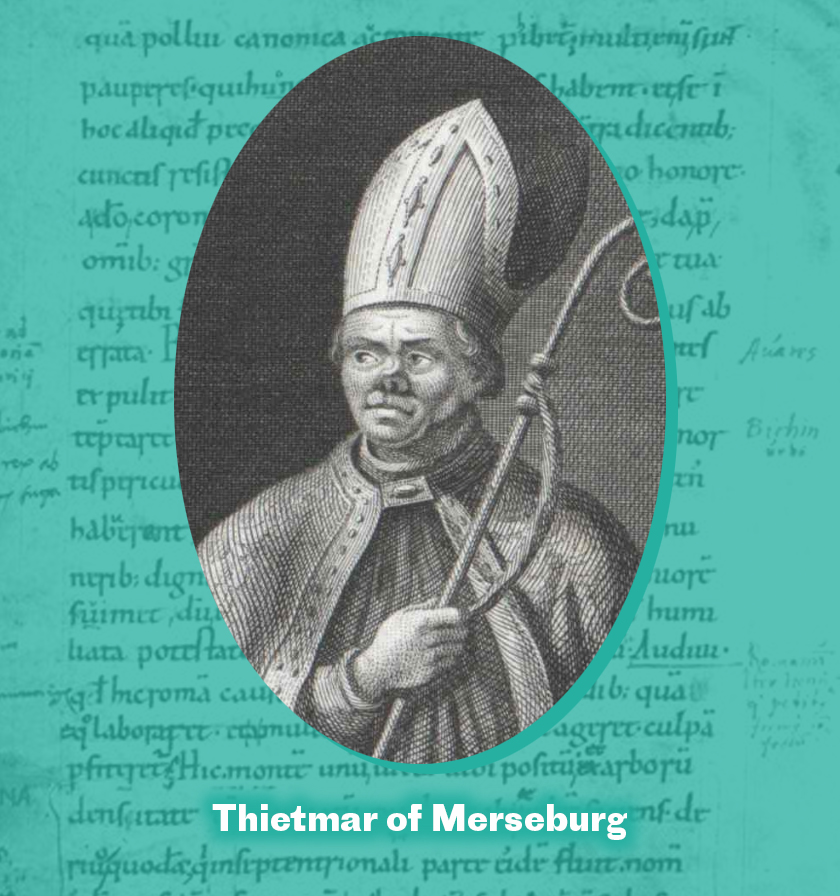
The Chronicle of Thietmar of Merseburg, written between 1012 and 1018, describes the “King of the Rus Vlodemir” as a “great and cruel dissolute man who committed great violence over the refined Denyen” (this is how the austere Germans referred to the Byzantines). Thietmar knows that the Russian ruler “took a wife from the Greeks” (whom he mistakenly called Helena), “illegally kidnapped” from Otto II and “at her insistence he accepted the holy Christian faith” which he did not embellish with good works even though at the end of his life he had “washed away the stain of sin by diligently performing works of great charity.”
The Scandinavian sagas connect the Baptism of Rus to their local heroes. Thus, in a number of late sages about Olaf Tryggvason (the first Christian king of Norway, 995 – 1000), there is a story of how Olaf took part in the conversion to the true faith of the konung Valdamar and all of the people of Gardariki (as the sagas call Rus). Having seen in a dream the terrible torments that await those who worship wooden idols, Olaf set off for Grikland (Byzantium) with his retinue, received baptism there from one bishop by the name of Paul and convinced him to go to Rus where he had lived during his childhood. Being well received by the konung, Olaf took a long time in persuading Valdamar to convert to Christianity and finally, with the help of the konung’s wise wife Allogia (in whom we can discern the features of Princess Olga) he convinced him to become baptized along with his people.
According to the chronology of the saga this episode is dated at AD 985 before the beginning of the Russian chronicle’s “choice of faith,” and many scholars take a sceptical view of its historical veracity.
The Eastern sources
The Christian Arabs Yayha of Antioch (eleventh century) and George Elmacin (thirteenth century), as well as the Muslim writers Abu Shugia ar-Rudravari (end of the eleventh century) and Ali Ibn al-Athir (thirteenth century) give a short but full and, more importantly, clear picture of the relationship between the emperor Basil and Prince Vladimir.
Let us quote Yayha’s story (which in the main repeats other authors), placed in the Byzantine context:
“The situation had become dangerous and concerned emperor Basil by virtue of the capabilities of his warriors and the possibility of them being defeated. His wealth was depleted and needs drove him to turn to the king of the Rus – even though they were his enemies – to ask him for help in his current position. And he (Vladimir) agreed to this.
And there was concluded between them a peace treaty, and the king of the Rus married the sister of the emperor Basil after he put to him the condition of receiving baptism along with his country and people, for they are a great nation. The Rus of that time did not recognize any law or observe any religion. And so, the emperor Basil sent to him metropolitans and bishops, and they baptized the king of the Rus and all those who inhabited his land, and sent to him his sister, and she built many churches in the land of the Rus.
And when they decided to conclude a marriage between themselves, there came the warriors of the Rus and joined with the warriors of the Greeks who were with the emperor Basil. Together they set off to do battle with Bardas Phocas at land and at sea at Chrysopolis. And they vanquished Phocas.”
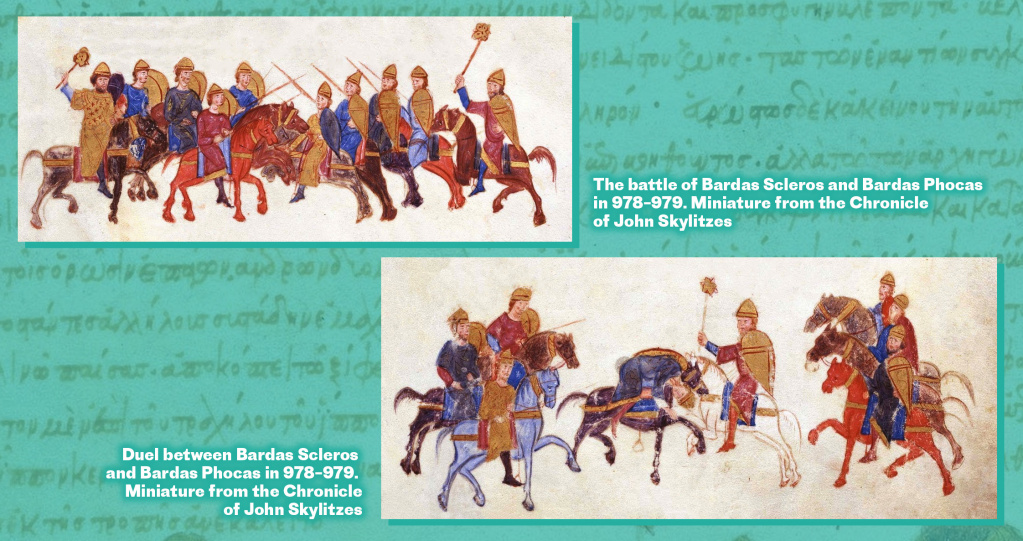
The sequence of events here – war with Rus, the treaty, the marriage and military aid – are confirmed by the Armenian historian Stepanos Taronetsi, known by the nickname ‘Asoghik’ (‘teller of stories’). Relating the events in Transcaucasia in which the emperor Basil II participated with his Russian retinue (“the people of Rus”), he notes the following: “There were six thousand infantry armed with spears and shields whom the emperor Basil has requested of the king of the Rus at the time when he had given his sister in marriage to the latter. It was at this time that the Rus came to believe in Christ.”
Was there a choice?
The chronicle’s story of the choice of religion is far from being a mere literary device, as some sceptics sometimes think. There is, of course, much that is legendary in it. Today it is difficult to imagine that centuries-old spiritual traditions were chosen in the course of conversations held at court. It is natural that political, economic and even geographic factors exerted a great influence upon the choice of a particular religion. Usually rulers only had one choice – between ancient tradition and a new doctrine.
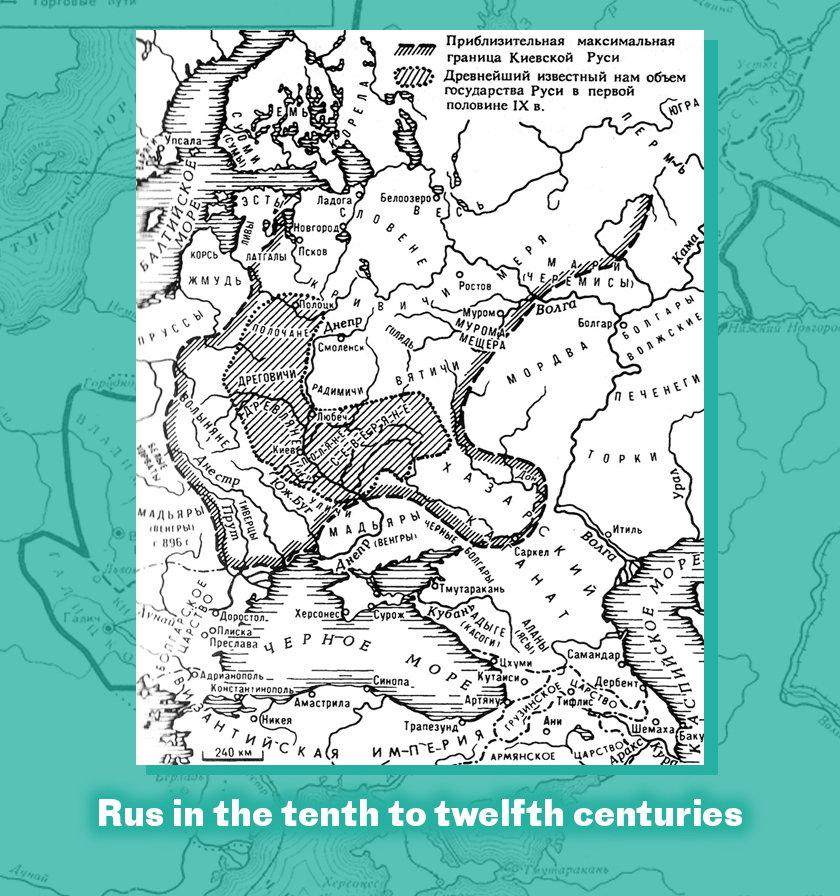
But there are regions in the world which literally are located at the crossroads of international links and which at the same time are subject to the influence of competing civilizations and religions. Thus, in the Balkans and in central Europe there was a clash of Latin and Greek Christianity (today we call these traditions Catholicism and Orthodoxy, although in antiquity these terms were used as synonyms). In the Caucasus there was Zoroastrianism, Christianity and Islam. In central Asia there was Christianity, Buddhism and Islam. In the land of the Khazars there was Judaism, Christianity and Islam. But it was far from everywhere that there was the opportunity of a real choice between all the variants of biblical monotheism of Judaism, Western and Eastern Christianity and Islam. And yet the one country which did have a choice was Rus.
In the eleventh century Rus was surrounded on all sides by countries where the dominant religion was one of the variants on monotheism: Islam in the East, Catholicism in the West, Judaism in the south east and Orthodoxy in the south west.
Vladimir’s ‘agenda’
Modern-day scholars have said much on the goals and intentions of Vladimir and of the advantages which baptism brought him personally and for his land. They claim that marriage with the sister of the Byzantine emperor elevated the Russian ruler to the heights of the world’s political hierarchy; that henceforth Rus had become an equal member of the international community; that it had now become an integral part of the highly-developed Byzantine culture and so on.
But it would be a good idea to listen to the opinions of the people of that time too. St. Vladimir – unlike, for example St. Constantine the Great – has not left us any written documents from which we can deduce his ‘religious and political agenda.’ There is, however, in the chronicle a prayer by the prince in which he turns to God after his baptism. Irrespective of the origin of these words, they do indeed reflect the view of a person of that time.
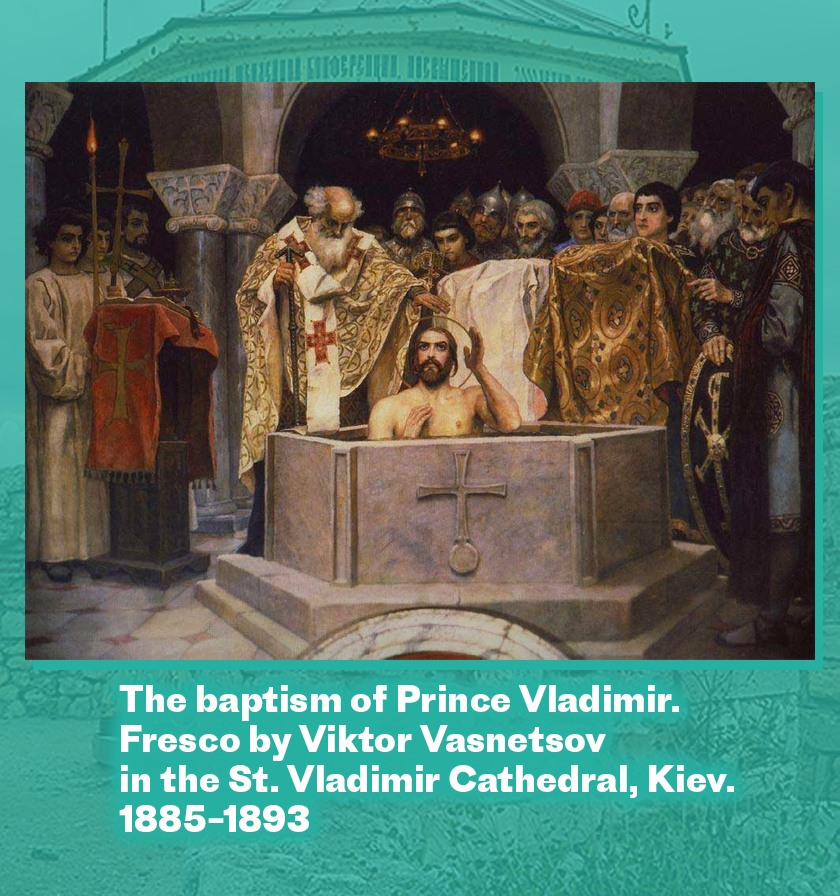
What does the newly-baptized Russian prince ask of God?
O God who art great and has created heaven and earth!
Look down upon this new people
And grant, O Lord, that they may know thee the true God
As the lands of the Christians have come to know thee.
And confirm in them the true and uncorrupted faith.
Help me, O Lord, to overcome my enemies set against me
That I may put my trust in thee and thy almighty power
And vanquish the wiles of the devil!
Most important of all, the prince entrusts his people to God as “his new people” and beseeches of him for his country enlightenment and confirmation in the true faith. For himself Vladimir asks for help in overcoming the enemy set against him, by which was meant not a military opponent but the devil – the archetype of evil in the world to whose designs can be attributed all manner of human enmity.
The discovery of truth and the victory over evil is Prince Vladimir’s short yet full ‘agenda.’ He would not consent to anything less.
The life-changing choice
Many Russian thinkers for whom the ideal was ‘enlightened Europe’ saw in ‘Vladimir’s choice’ a fateful error which predetermined Russia’s doomed backwardness compared to the developed countries of Europe. Their opponents, on the other hand, affirmed the benefits and salvation which the Baptism of Rus brought according to the Greek ritual and which allowed our nation to receive the ‘pure’ Christian faith and preserve a religiosity now lost by the West. In returning to the times of Prince Vladimir and attempting, in as far as the sources allow, to make with him once more this historical choice, we can draw a number of important conclusions.
Firstly, the prince genuinely did have a choice. In spite of the fact that before Vladimir in Rus there were already many Christians who adhered to the Greek (i.e. Orthodox) rituals, in spite of the example of the most wise Olga and many of his other contemporaries, the Russian prince was completely free to choose another path.
Moreover, the choice for Orthodoxy did not open up the prospect of any practical advantages for either the prince or the elites that surrounded him. The high moral bar set by Christ demanded a renunciation of the usual way of life, of the favourite pleasures and entertainments. But of paramount importance was the fact that Christianity, which had expressly forbidden robbery and killing and had unconditionally condemned all forms of armed violence, posed a threat to the activities of the Russian ‘military aristocracy,’ that is, to their military campaigns. Byzantium, the closest and wealthiest neighbour of Rus, was transformed from being an attractive place to loot to becoming a powerful ally sharing the same faith, and there could be no moral justification for war with her. Regarding the obvious advantages of the new religion as the foundation of statehood, then Latin Christianity was in no way any worse, and perhaps even better, in asserting for the state an ideology of centralization and social order, while Islam and Judaism established even more secure horizontal social connections predicated on the idea of fraternal mutual aid and the unity of faith communities.
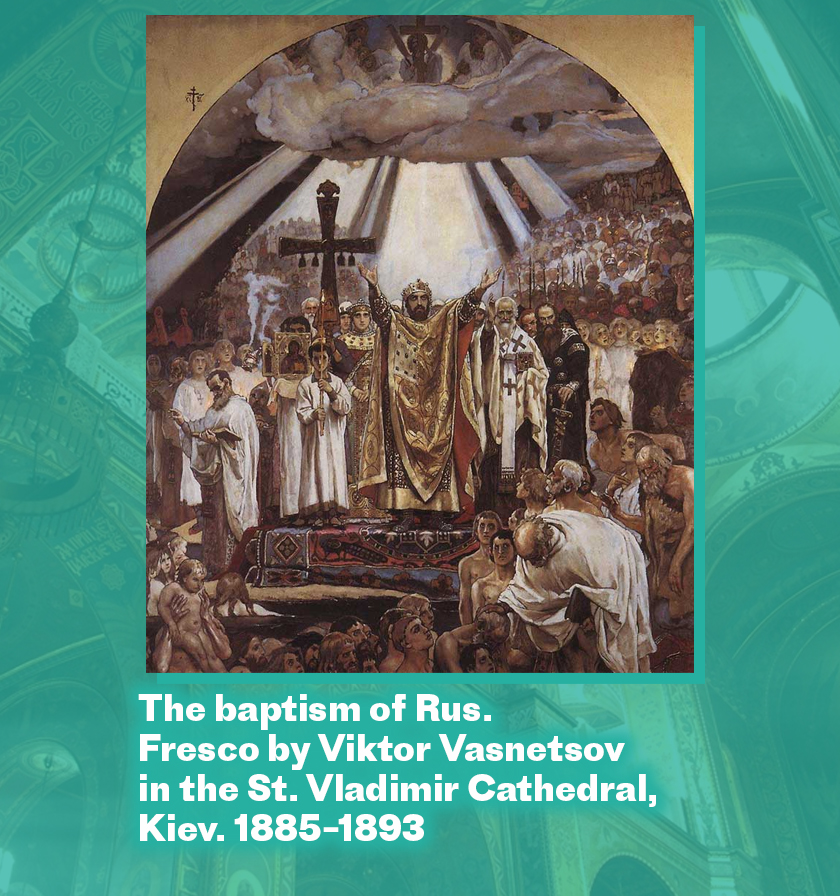
No, it was not political or practical goals that motivated Prince Vladimir when he chose the Eastern Christian model of civilization. What attracted him in Orthodox Christianity were the loftier and perhaps not totally comprehensible to the modern mind categories of spiritual heroism, elevated beauty, truth and love. It was not ‘fasting in as far as is possible’ that attracted the Russian prince but austere asceticism. Not formal rituals but an unearthly beauty and the harmony of the Divine Liturgy. Not economic interests but sacrificial love of neighbour. Not political pragmatism but the seeking out of the kingdom of heaven for life everlasting in God.
Was the choice made 1032 years ago the right choice? History has provided us with the answer to this question. The loose conglomeration of tribes gathered together by the first Riurikids by the time of Vladimir’s sons had already been transformed into a powerful state that impressed its European neighbours with its wealth. Having endured the tribulations of feudal disintegration and the Mongol-Tartar yoke, Rus was revived around Moscow and picked up the banner of the Orthodox realm that had fell from the hands of a weakened and deadened Byzantium that had betrayed her own ideals. Neither the terrible events of the Time of Troubles nor the temptations of Europeanization have shaken the spiritual principles which form the cornerstone of the Russian nation. And even the cruel social experiments of the twentieth century could not tear out the profound moral values which had been determined by Vladimir’s choice. The ideals of goodness, charity and justice, the willingness to sacrifice oneself through love and the priority of the spiritual over the material have all been preserved within people’s hearts, and it is precisely this which helped the Soviet people to obtain victory in the most terrible war in history and become a leader among nations.
